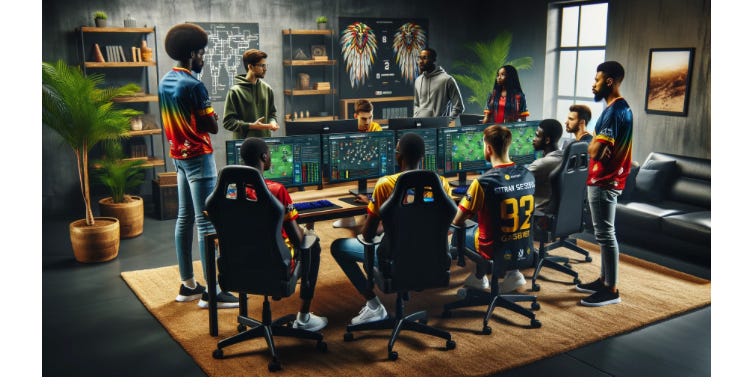Africa's Mobile Gaming Market Set to Break into Global Top Three
Africa's gaming industry is on the cusp of a major breakthrough, with projections indicating that the continent could soon rank among the top three global markets for mobile games. Recent reports highlight a dramatic surge in the gaming sector's market value, with mobile gaming leading the charge. As smartphone penetration increases and internet connectivity improves, Africa is poised to reshape the global gaming landscape. Here's a closer look at the key findings and insights shaping this dynamic industry.
Rapid Growth of the African Gaming Market
According to recent data, the African gaming market is expected to exceed $1 billion by the end of 2024, marking a significant milestone for the continent. The Pan Africa Gaming Group (PAGG) and GeoPoll conducted a survey across key African nations—Nigeria, Egypt, Kenya, and South Africa—revealing that a staggering 92% of gamers prefer playing on their smartphones. This overwhelming preference for mobile gaming is a testament to the growing accessibility of smartphones and the Android platform's dominance, with 92% of respondents downloading games from the Google Play Store.
Nigeria-based Maliyo Games also released its Africa Games Industry Report, shedding light on the dynamic nature of the gaming industry in Africa. The report highlighted that over 200 million gamers across the continent are now spending hundreds of millions of dollars, primarily on mobile platforms. This growth is further corroborated by Newzoo's projections, which foresee the African gaming market surpassing $1 billion in consumer revenue by 2024.
Engagement and Expenditure Patterns
The African gaming community is highly engaged, with gaming serving as a primary source of entertainment and relaxation for many. The GeoPoll and PAGG survey found that 73% of gamers play for fun, while 64% do so to relieve stress. Financial investment in gaming is also noteworthy, with 63% of gamers having made purchases related to gaming. However, the majority of these expenditures are modest, with 29% of gamers spending between $2 to $5 monthly.
Despite this willingness to spend, there are notable barriers to gaming purchases. The survey revealed that 47% of gamers prefer free games, and 44% cited a lack of funds as a significant challenge. Additionally, the high cost of data bundles (42%) and expensive gaming hardware (31%) are among the top concerns for African gamers.
Cultural Representation and Local Content Creation
Cultural relevance is a critical factor for African gamers. Over half of the respondents expressed a desire for games that reflect their cultural identities, with 44% stating that there are not enough games featuring characters or environments that resemble their own lives. This presents a significant opportunity for local content creators to fill this gap and cater to the unique preferences of African gamers.
However, the visibility of locally made games remains limited. The survey found that 56% of respondents were unaware of any games developed in Africa, indicating a gap in market penetration for local developers. This underscores the need for greater support and visibility for African game developers.
The Local Gaming Scene and Its Challenges
The local gaming scene in Africa is vibrant yet faces several challenges. For instance, financial constraints and infrastructure issues, such as unstable power supply and unaffordable internet access, continue to hinder the growth of the industry. Despite these challenges, there is a growing interest in supporting local talent, with varying sentiments across different countries regarding the importance of locally produced games.
Jay Shapiro, chairperson of PAGG, emphasized the immense potential for growth in the African gaming industry, stating, "This report shows the true potential of the continent’s billion youth to find, play, and purchase locally relevant games." With Africa being the fastest-growing global market in the gaming industry, the continent is well-positioned to play a significant role in the global gaming ecosystem.
Investment and Future Prospects
Venture capital (VC) funding has been instrumental in supporting the growth of the African gaming industry. Startups like Carry1st, a South African publisher of social games, have attracted substantial investment from prominent funds, including Andreessen Horowitz (a16z) and Konvoy Ventures. Carry1st's recent $27 million pre-Series B funding round underscores the growing investor confidence in Africa's gaming potential.
Africa is also emerging as a fast adopter of web3 technology, with blockchain gaming offering new opportunities for decentralized gaming experiences. The integration of decentralized finance (DeFi) and non-fungible tokens (NFTs) into gaming ecosystems could empower African gamers to truly own their in-game assets and participate in value creation within virtual economies.
The Role of Mobile and Internet Infrastructure
The rise of mobile gaming in Africa is closely tied to the increasing number of internet users and the widespread adoption of smartphones. In Nigeria, for instance, 82% of web traffic is generated via smartphones, reflecting the continent's reliance on mobile connections. As internet penetration continues to grow, particularly with the shift from 3G to 4G networks, the mobile gaming market in Africa is expected to expand even further.
Last words, the continent's payment infrastructure remains a challenge, with cash still being the dominant payment method. The development of mobile-first payment solutions and the adoption of e-payment systems will be crucial in unlocking the full potential of Africa's gaming market.




